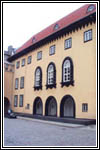 |
Vol 0, No 17
19 January 1999 |
|
|
 T H E A M B E R C O A S T:
T H E A M B E R C O A S T:
Stability Still Not in Style Mel Huang For a few moments following the Saeima elections of 3 October 1998, it appeared Latvia would finally enjoy a stable majority government. Three parties in the centre-right boasting similar platforms gained 62 out of 100 total seats, a majority never before enjoyed in the 80 year (albeit interrupted from 1934 to 40 by authoritarianism and 1940 to 1990 by Nazi and Soviet occupations) history of Latvian parliamentary democracy. Since the restoration of independence, there has been only one majority government, strung together as a rainbow coalition after two failed attempts to form a government following the 1995 general elections. Sadly, that dream soon dissipated as the two leading vote-getters - the centre-right populist People's Party of former Prime Minister Andris Skele and the centrist liberal Latvia's Way of foreign minister and former prime minister Valdis Birkavs - faced off on who would lead the new government. The aforementioned rainbow coalition of 1995-97 was led by then-apolitical businessman Skele, whose style of managing the government was described as either commanding or authoritarian, depending on whose comment one sought. With the People's Party pushing for Skele and Latvia's Way insistent on former Minister of Transportation Vilis Kristopans to be the prime minister, the latter managed to link up with two other parties and gain the nomination from President Guntis Ulmanis. On 26 November 1998, Prime Minister Kristopans was confirmed in a minority coalition of his Latvia's Way, the right-wing For Fatherland and Freedom, and the centrist New Party. Despite a similar political platform the People's Party voted against the government while most of the left-wing Social Democratic Union supported the government. Will Green Turn Red?
Among the problems in the new minority government is what to do with the Social Democrats. Prime Minister Kristopans, after the support shown on the confirmation vote, surprisingly invited Peteris Salkazanovs of the Social Democrats to become the new agriculture minister, seeking to provide some 14 seats of insurance for the governing coalition that only boasts 46 out of 100 seats in the Saeima. This move, to bring a left-wing minister into an otherwise centre-right government, has angered many within the coalition. With the coalition agreement stipulating that the introduction into the government of a non-coalition member must be approved by all three parties, the right-wing For Fatherland and Freedom has balked at the left-wing presence. They are essentially delaying the final formation of the government by withholding their approval for Salkazanovs, forcing the Prime Minister to designate a temporary agriculture minister. Unnecessary Crisis?
Many political observers feel that a government crisis is imminent over several reasons. First of all, the coalition is a minority at 46 seats out of 100 total mandates. This means that defection, attendance and discipline are all vital concerns. Of the remaining 54 seats, there is little insurance for the government over important issues. The opposition People's Party, despite the similar political agenda, will likely seek all opportunity to embarrass, if not straight-out doom, the government they felt they earned the right to lead. The remaining seats are held by two left-wing parties with different views on many issues, including privatisation and citizenship. Following that point, the second fear is that the courting of the 14 seats held by the Social Democrats by coalition-leader Latvia's Way would eventually alienate the right-wing For Fatherland and Freedom and its 17 seats. In other words, Prime Minister Kristopans can count on only 46 seats, if that many, if he is to keep the coalition from splitting off the bat. Again many voice the opinion that this imminent crisis is unnecessary, as a coalition of People's Party, Latvia's Way and For Fatherland and Freedom, can easily muster a majority. Most politics watchers, including noted analyst and human rights campaigner Nils Muiznieks, believe that the three parties have very similar platforms over key issues, for example citizenship, privatisation, foreign relations, language and budgetary matters. However, if the personality issue over Skele or no Skele cannot be resolved in the coming future, there is not much confidence that the government will survive the four-year life of the Seventh Saeima. Mel Huang, 19 January 1999
|
|
![]()
Copyright (c) 1999 - Central Europe Review and Internet servis, a.s.
All Rights Reserved